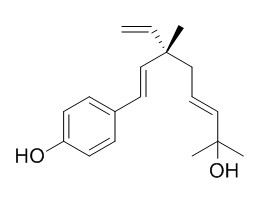Delta3,2-Hydroxylbakuchiol
Delta3,2-Hydroxylbakuchiol, a monoamine transporter inhibitor involved in regulating dopaminergic and noradrenergic neurotransmission and may have represented potential pharmacotherapies for disorders such as Parkinson's disease, depression, and cocaine addiction.
Inquire / Order:
manager@chemfaces.com
Technical Inquiries:
service@chemfaces.com
Tel:
+86-27-84237783
Fax:
+86-27-84254680
Address:
1 Building, No. 83, CheCheng Rd., Wuhan Economic and Technological Development Zone, Wuhan, Hubei 430056, PRC
Providing storage is as stated on the product vial and the vial is kept tightly sealed, the product can be stored for up to
24 months(2-8C).
Wherever possible, you should prepare and use solutions on the same day. However, if you need to make up stock solutions in advance, we recommend that you store the solution as aliquots in tightly sealed vials at -20C. Generally, these will be useable for up to two weeks. Before use, and prior to opening the vial we recommend that you allow your product to equilibrate to room temperature for at least 1 hour.
Need more advice on solubility, usage and handling? Please email to: service@chemfaces.com
The packaging of the product may have turned upside down during transportation, resulting in the natural compounds adhering to the neck or cap of the vial. take the vial out of its packaging and gently shake to let the compounds fall to the bottom of the vial. for liquid products, centrifuge at 200-500 RPM to gather the liquid at the bottom of the vial. try to avoid loss or contamination during handling.
J.Korean Soci. Food Sci. Nutri.2024, 53(11):1166-1177
Int J Mol Sci.2019, 20(14):E3538
Journal of Third Military Medical University2019, 41(2):110-115
Int J Mol Sci.2022, 23(10):5813.
Food Funct.2020, 11(2):1322-1333.
Natural Product Communications2022, 7(3):1-7.
Data Science for Genomics2023, 107-128.
FASEB J.2019, 33(8):9685-9694
Molecules.2021, 26(3):695.
Biochem Biophys Res Commun.2020, 522(4):1052-1058
Related and Featured Products
Cell Mol Life Sci. 2009 May;66(9):1617-29.
In vitro dopaminergic neuroprotective and in vivo antiparkinsonian-like effects of Delta 3,2-hydroxybakuchiol isolated from Psoralea corylifolia (L.).[Pubmed:
19322517 ]
Cocktail recipes containing Psoralea corylifolia seeds (PCS) are used to empirically treat Parkinson disease. A PCS isolate Delta3,2-Hydroxylbakuchiol(BU) can inhibit dopamine uptake in dopamine transporter (DAT) transfected Chinese hamster ovary (CHO) cells, and dopamine reuptake blockade may provide an alternative approach for ameliorating parkinsonism.
METHODS AND RESULTS:
Here, we assessed the potential dopaminergic neuroprotective, and antiparkinsonian-like activity of BU. BU sample size was increased by using a scale-up extraction paradigm. Pharmacologically, BU significantly protected SK-N-SH cells from 1-methyl-4-phenylpyridinium (MPP(+)) insult, produced striking inhibitory actions on dopamine/norepinephrine uptake and WIN35,428 binding in synaptosomes on in vivo administration, and significantly preventing poor performance on rotarod and dopaminergic loss in substantia nigra in 1-methyl-4-phenyl-1,2,3,6-tetrahydropyridine (MPTP) mice.
CONCLUSIONS:
BU acts by protecting dopaminergic neurons from MPP(+) injury and preventing against MPTP-induced behavioral and histological lesions in the Parkinson's disease (PD) model, possibly by inhibiting monoamine transporters. These findings suggest that BU could be meaningful in PD treatment.
Biochem Pharmacol. 2008 May 1;75(9):1835-47.
Bakuchiol analogs inhibit monoamine transporters and regulate monoaminergic functions.[Pubmed:
18329002 ]
Monoamine transporters play key roles in controlling monoamine levels and modulating monoamine reuptake. The objective of the present study was to identify monoamine transporter inhibitors from herbal sources.
METHODS AND RESULTS:
We discovered that bakuchiol analogs isolated from Fructus Psoraleae inhibited monoamine transporter uptake to differing degrees. The bakuchiol analog, Delta3,2-Hydroxylbakuchiol was the most potent and efficacious reuptake blocker and was thus selected as the candidate target. Monoamine transporter inhibition by Delta3,2-Hydroxylbakuchiol was more selective for the dopamine transporter (DAT) (IC50=0.58+/-0.1 microM) and norepinephrine transporter (NET) (IC50=0.69+/-0.12 microM) than for the serotonin transporter (SERT) (IC50=312.02+/-56.69 microM). Delta3,2-Hydroxylbakuchiol exhibited greater potency (pEC50 for DAT and NET) than bupropion and exhibited similar efficacy (E(max) for DAT and/or NET) to bupropion and GBR12,935. Pharmacokinetically, Delta3,2-Hydroxylbakuchiol competitively inhibited DAT and NET with partial reversibility and occupied cocaine binding sites. Moreover, Delta3,2-hydroxybakuchiol counteracted 1-methyl-4-phenylpyridinium-induced toxicity in cells expressing DAT with similar efficacy to GBR12,935. In vivo studies showed that Delta3,2-Hydroxylbakuchiol increased the activity of intact mice and improved the decreased activity of reserpinized mice.
CONCLUSIONS:
In the conditioned place preference test, preference scores in intact mice were unaffected by Delta3,2-Hydroxylbakuchiol treatment. Bakuchiol analogs, especially Delta3,2-Hydroxylbakuchiol , are monoamine transporter inhibitors involved in regulating dopaminergic and noradrenergic neurotransmission and may have represented potential pharmacotherapies for disorders such as Parkinson's disease, depression, and cocaine addiction.



